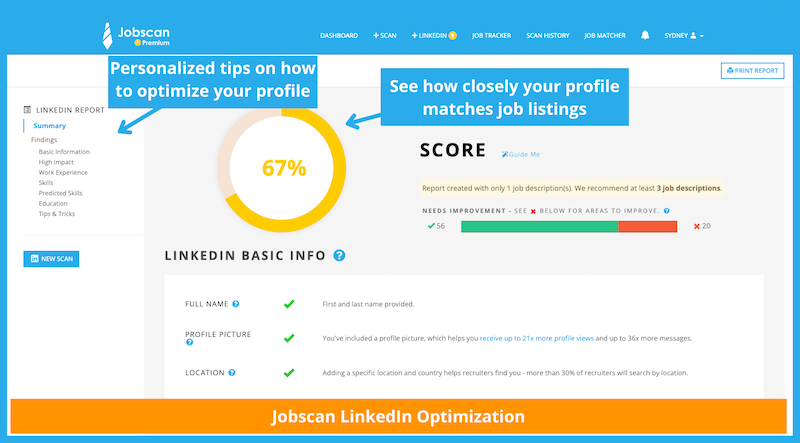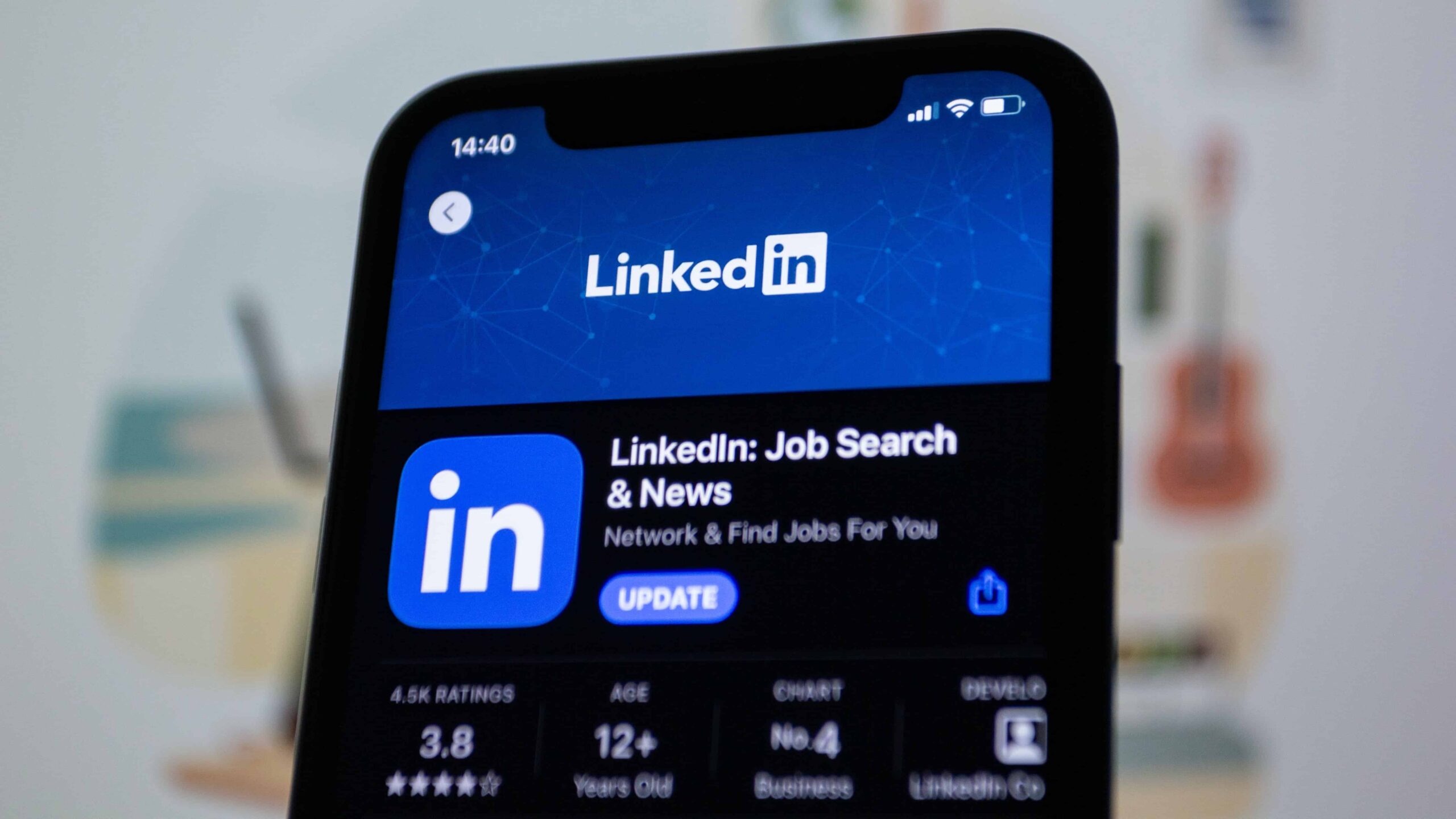You might not realize it, but your LinkedIn summary section is one of the most important parts of your profile.
Why? Because after the headline, the summary is the first thing visitors read when they check out your profile on LinkedIn.
Think of your summary as an elevator pitch – you only have a few seconds to present yourself, so you need to make it count!
In this article, we will unpack everything you need to know about the LinkedIn summary section.
We’ll also provide you with tips, strategies, and examples to help you create a powerful summary that will land you more job interviews.
In this article
- What is a LinkedIn summary?
- How to write a LinkedIn summary that will get you noticed
- LinkedIn summary examples
- Why is your LinkedIn summary so important?
- LinkedIn summary vs resume summary
- LinkedIn summary FAQs
- Key takeaways
What is a LinkedIn summary?
The LinkedIn summary, which is also called the “LinkedIn Bio” or “About Me” section, appears right underneath your photo on your profile page.

The goal of your summary is to present a concise, yet compelling, snapshot of your professional identity.
With its 2,600 character limit, the summary gives you approximately 370 words to explain who you are, what you do, and what makes you unique.
Your summary is your best opportunity to make a good first impression on anyone who visits your LinkedIn profile, so don’t waste it!
How to write a LinkedIn summary that will get you noticed
A great LinkedIn summary can help you get noticed by potential employers and clients.
Here’s how to write a summary that will help you stand out.
1. Tell your story
Before you start writing your summary, remember that you want it to read more like a story than a resume.
This means you should try to avoid excessive bullet points and detailed work history and instead try to craft an engaging narrative that grabs the reader’s attention.

2. Be conversational
Your writing style in your summary should be conversational. A conversational writing style is one that mimics the way people speak to each other in everyday life.
Conversational writing is meant to be easy to read and understand, as well as interesting and entertaining.
3. Hook the reader right away
Visitors to your profile page will only see the first 3 lines of your summary. Then they have to click “read more” to see the rest.
This means the first 3 lines are the most important part of your summary!
If you can hook readers with your first three lines, it’s much more likely they’ll want to read the rest of your summary and profile.
“Hook readers with the first 3 lines of your summary and they’ll want to read more.”
How do you hook your reader? Generally speaking, your opening should convey the number one thing you want your readers to know about you.
What sets you apart from everyone else? What combinations of skills help you achieve results? Why do you love your work? What outstanding accomplishments do you have?
Answering these questions can help you uncover a compelling opening statement.
94% of recruiters use LinkedIn to vet job candidates. Optimize your LinkedIn profile and show that you’re a recruiter’s perfect candidate.

Click here to start optimizing your LinkedIn profile
4. Be concise
Hiring managers and recruiters are busy people; they don’t have time to read a long, rambling essay.
Keep your summary short and to the point. Try to focus on the most important information and leave out any fluff.
5. Write in the first person
When you write in the first person, you use pronouns such as “I,” “me,” and “my.” This gives your writing a more personal, authentic feel.
For example, instead of saying “John Smith is a marketing professional with 10 years of experience,” you would say, “I am a marketing professional with 10 years of experience.”
Writing in the first person allows you to share your story in your own words.
This can be especially powerful if you have a unique or inspiring story to share about your career journey.
6. Use the right keywords
When recruiters search for candidates on LinkedIn, they type in certain job-related keywords. These keywords can be skills, job titles, or industry jargon.
Try to include as many of these keywords in your summary as possible!
Why? Because using the right keywords will ensure that your profile shows up more often when recruiters type those keywords into the LinkedIn search bar.
How do you find the right keywords to use? Simply scan the descriptions of the jobs you’re applying to and see what words appear most frequently.
The quickest and easiest way to find relevant keywords is to use Jobscan’s LinkedIn Optimization Tool.
This tool uses intelligent technology to analyze your LinkedIn profile against jobs you’re interested in.
It will show you exactly which keywords you should include in your LinkedIn summary and profile, and where to use them.
7. Focus on your strengths
When writing your summary, focus on your strengths and accomplishments.
What are the initiatives that you’ve taken charge of? What have you done that you’re proud of? What accomplishments can you share that will impress others?
As you talk about your accomplishments, weave in how your strengths helped you achieve them. This will show employers how you can help them and why they should choose you.
If you’re not sure what your strengths are, try asking other people what they think your strengths are. This can be done informally by asking friends, family, and colleagues for their input.
You can also take a free personality test to find your true strengths.
Learn more about how to discover your strengths and accomplishments:
8. Discuss your background
While the LinkedIn summary is not the place to publish your autobiography, you do want to include enough information to give readers a good sense of your professional background.
If you have an extensive work history, you may want to focus on your most recent positions and highlight your key responsibilities in each role.
If you’re just starting out in your career, you can use your summary to discuss your educational background and any relevant internships or work experience you have.
9. Describe your current position
The simplest way to describe your current position in your LinkedIn summary is to just state your title and company. For example: “I am currently a software engineer at Google.”
If you want to elaborate further, you can include a brief description of your role or responsibilities. For example…
“My current position is as a Communications Strategist at an ad agency. I help develop and execute communications plans for our clients that help them achieve their business goals. I also manage a team of communication specialists who work on various accounts.
In my role, I often collaborate with account managers, creatives, and media teams to ensure that our client’s messages are effectively communicated to their target audiences.”
10. Detail your accomplishments
Don’t just list your accomplishments in the summary. There’s a separate section in LinkedIn for doing that.
Remember, your LinkedIn summary should be an engaging narrative that tells the story of your professional life. So do your best to make it interesting and exciting to read!
When writing about your accomplishments, highlight those that are most relevant to the type of job or industry you are targeting.
If you have a long and impressive list of accomplishments, mention only those that demonstrate your skills and abilities in the most positive light.
11. Include numbers and data
Whenever possible, try to include numbers and data in your summary.
Numbers not only attract attention, but they can give your readers a more concrete understanding of your skills and experience.
You might tell readers how many years you’ve been working in your field, or highlight specific projects you’ve worked on that were particularly successful.
For example, you could say “Managed a team of 12 people” or “Increased sales by 20%”.
Whatever numbers and data you choose to include, make sure they’re relevant and interesting – otherwise, you risk boring your reader!

12. Highlight relevant skills and talents
Try to add as many relevant skills and talents to your summary as possible, while still keeping it interesting and readable.
This is important because skills and talents serve as the primary source of keywords that recruiters are searching for.
You can incorporate these keywords into your summary with examples of how you utilized your skills and talents to excel in your current role, as well as in previous roles.
However, try to avoid skills that are too basic for your current professional level. For example, if you’re an IT specialist, mentioning MS Office would be strange.
One way to find the most relevant keywords for your summary is to use Jobscan’s LinkedIn Optimization Tool.
It works by analyzing your LinkedIn profile against jobs you’re interested in. This tool is super easy to use and will help you land more job interviews!
13. Show some personality
As mentioned earlier, your LinkedIn summary is one of the most important aspects of your profile because it’s an opportunity for you to show off your personality.
To do this, make sure you write conversationally, which means using language that sounds natural and human.
In addition, try to feature some personal details and interests so that people can get to know you better and decide whether you’d fit within a company’s culture.
Most importantly, be yourself! Don’t try to copy someone else’s style or tone.
“Be yourself! Don’t try to copy someone else.”
However, it’s important to strike the right balance. You want to come across as genuine and likable, but you also don’t want to overshare or seem unprofessional.
A little bit of personality goes a long way on LinkedIn!
14. State your future ambitions
Sharing your professional ambitions on your LinkedIn summary can help recruiters decide whether you’d be a good fit for their organization.
You can do this by:
- Being clear and concise about what you want to achieve.
- Making sure your goals are realistic and achievable.
- Connecting your ambitions to your overall career strategy.
Stating your future ambitions like this will help you to stand out from the competition and increase your chances of being hired for the role.
15. Include a call to action
The final lines of your summary should include a call to action (CTA). The purpose of the CTA is to urge readers to connect with you in some way.
Here’s an example of a CTA:
“If you’re interested in learning more about my professional journey, connect with me on LinkedIn!”
Pretty simple, isn’t it? Your CTA can also prompt readers to visit your website or contact you for more information.
Including a call to action in your LinkedIn summary is a great way to encourage readers to take a specific, desired action that will help you achieve your objectives.

16. Make use of whitespace
Your LinkedIn summary should NOT be one big block of text. That’s visually unappealing and hard to read.
Instead, use whitespace to break up your text.
You can do this by using short paragraphs. Breaking your text up into small chunks like this makes it easier for readers to digest.
“Break up your text into small chunks to make it easier to digest.”
Another way to use whitespace effectively is by including relevant images and videos. This can help break up your text and add visual interest.
Just make sure that any images or videos you include are high-quality and relevant to your content.
Overall, using whitespace effectively can help make your LinkedIn summary more engaging and easier to read. So don’t be afraid to use it!
17. Add relevant attachments
Adding attachments to your LinkedIn summary can help you stand out and showcase your work in a more professional light.
By including links to PDFs, slideshows, or even video clips, you can give potential employers or clients a more well-rounded view of your skills and experience.
Plus, it can help demonstrate your ability to use technology to your advantage, which is helpful for most jobs these days.
LinkedIn summary examples
We just went over some important tips and strategies that can help you create a powerful LinkedIn summary.
Now let’s look at some actual real-life LinkedIn bio examples!
NOTE: Take inspiration from these sample LinkedIn summaries but DO NOT copy them.
- LinkedIn summary examples for students
- LinkedIn summary examples for recent graduates
- LinkedIn summary examples for career changers
- LinkedIn summary examples for entrepreneurs
- LinkedIn summary examples for professionals and job seekers
LinkedIn summary examples for students
A good LinkedIn summary is not only important for experienced professionals, it’s also important for students who are not yet in the workforce, still working on a college degree, or applying for internships.
Here are three examples of how to “work with what you’ve got” and make a great first impression on LinkedIn.
Daniel R., Public Policy Analysis Student

Why this works: This summary is clear and concise, easy to read, and outlines both the skills gained from classwork and an internship.
Sarah T., Arts and Culture Management Student

Why this works: This is an excellent example of leaning on your personal character qualities and providing clear examples of how they will enhance your ability to do the job well.
At the internship level, you don’t have to provide a ton of experience to be well-suited for the roles. Sharing about your personality and values can be equally important.
Kelly L., Digital Arts & Sciences Student

Why this works: Another clever strategy is to expound on the unique learning opportunities you’ve experienced in college.
Study abroad experiences, volunteer work, and personal passion projects can all be useful ways to express the value you have to offer.
LinkedIn summary examples for recent graduates
As a recent graduate, you should focus on your academic achievements, internships or other relevant experience, and extracurricular activities that demonstrate your skills and interests.
Keep your summary concise and clear, and try to convey your personality. The goal is to present yourself as someone people would want to connect with.
Tiffinni S., International Finance and International Economics

Why this works: This is a very concise, yet detailed, summary. Tiffinni starts off by injecting some personality, then quickly outlines her academic career, her skills and talents, and her work experience.
Megan M., Criminal Justice

Why this works: While this summary could have used whitespace more effectively, Megan does a great job conveying her passion and focusing on the strengths that will make her an excellent asset for any organization.
Anthony F, Accounting and Finance

Why this works: Anthony does a great job of expressing his personality in the first couple of lines. He then discusses his academic achievements, extracurricular activities, and his ambitions for the future.
He not only tells his story, but he makes it appealing to read by breaking up the text and keeping things concise.
LinkedIn summary examples for career changers
If you’re changing your career, your LinkedIn profile summary should highlight any transferable skills, relevant coursework, or volunteer experiences that show you have what it takes to succeed in your new chosen profession.
You can also include a sentence or two about your professional goals to give your profile some direction.
Jacob H., Airline Pilot to Aviation Technical Writer

Why this works: The first 3 lines of this summary tell the reader exactly who Jacob is and what his career change involves. It’s a perfect elevator pitch!
He also provides specific examples of how his previous experience is relevant to his new dream job, and the efforts he’s making to close any gaps in his education or training.
Michael R., Staffing/Recruiting Account Manager to Software Sales Account Executive

Why this works: This is a good LinkedIn summary outline to follow for a career change, particularly if you’re looking to stay in the same general line of work but shifting industries or niches.
Michael also does a great job of highlighting his experience and skills that are relevant to his new career direction.
LinkedIn summary examples for entrepreneurs
Every entrepreneur is unique, but there are a couple of things that all great LinkedIn summaries for entrepreneurs have in common.
- The summary should show off the entrepreneur’s personality and give readers a sense of what it would be like to work with them.
- The summary should demonstrate why the entrepreneur is an expert in their field and why someone should consider doing business with them.
Here are some examples:
Cassandra C., Online Business & Marketing Mentor

Why this works: Cassandra’s summary clearly conveys two things – her passion for helping people grow their business and her many years of experience.
Her summary brims with energy and confidence, and clearly demonstrates why she is an expert in her field.
Gillian H., Content And Copywriting Strategist

Why this works: Entrepreneurs can also craft a summary that reads more like a sales pitch.
This type of summary should clearly explain what you do and how you can help people. Make sure you’re not being overly sales-y!
Michelle G., Photographer And Graphic Designer

Why this works: It’s especially important for entrepreneurs to stand out from the crowd, and a good way to do this is to write a summary with a unique voice.
In this summary, Michelle showcases her playful personality while still providing evidence of her expertise.
If you decide to create a summary like this, make sure that you don’t forget to include important keywords and that your style aligns with your audience’s sensibilities.
LinkedIn summary examples for professionals and job seekers
If you’re a professional, the LinkedIn summary is a great opportunity to showcase your unique value proposition, which shows prospective employers what you can bring to the table and what sets you apart from everyone else.
Daniel C., Customer Experience Specialist

Why this works: Daniel’s personality shines through his summary, but most importantly he demonstrates his process, which allows prospective employers to see exactly how he would approach the work.
Jessica L., Software Engineer

Why this works: Not everyone is a writer and not every job will care if you can craft a narrative in your summary.
If you’re not sure what else to do, use the summary to clearly lay out your skills, tech proficiencies, and certifications.
Alaina C., Social Media Director

Why this works: Short, easy-to-read sentences keep this summary moving while still providing important information about who the writer is beyond just a description of their job.
This is an excellent example of providing a holistic viewpoint of an individual, beyond just the hard skills.
Alison H., SEO Content Writer

Why this works: Alison’s summary uses numbers in the opening line, which is a great way to grab the reader’s attention and entice them to learn more.
Presenting the results of her personality test provides a different perspective to not only her skills, but how she might approach different situations in the workplace.
Why is your LinkedIn summary so important?
LinkedIn is one of the first places recruiters and hiring managers go to learn about and find prospective employees.
In fact, studies show that 6 people are hired on LinkedIn every minute!
That’s why it’s so important to create a strong, compelling LinkedIn summary that highlights your professional accomplishments and skills.
“Six people are hired on LinkedIn every minute, so try to create a strong, compelling summary.“
But your LinkedIn summary is important for another reason – it’s a great way to set yourself apart from everyone else.
LinkedIn has over 800 million users. That’s a lot of competition! A compelling summary can help you stand out from the crowd.
The summary section is also important because it allows you to inject a little personality into your profile. It’s where you can truly express yourself and tell your story.
What motivates you? What kind of experiences have you had? What are you passionate about?
Adding some non-professional details about yourself can breathe life into your summary, making you more attractive to prospective employers.
Finally, your LinkedIn summary is important because you can include keywords that recruiters are searching for.
These keywords are usually related to:
- Hard skills
- Soft skills
- Job titles
- Industry keywords
Having these keywords in your summary strengthens the searchability of your profile, giving you a leg up on the competition.
Even if you’ve uploaded a great profile photo, customized your LinkedIn headline, created a cover story video, and listed all your work and education history, leaving the summary section blank or just typing a short tagline that’s better suited for a headline is a huge missed opportunity.
If you need help fully optimizing your LinkedIn summary and profile for searchability, try Jobscan’s LinkedIn Optimization Tool.
This tool will analyze your LinkedIn profile against jobs you’re interested in to show you exactly which keywords you should be including in your profile.
LinkedIn summary vs resume summary
Many job seekers make the mistake of writing their LinkedIn summary the same way they write their resume summary.
A resume summary is a short, clear statement at the top of your resume that highlights your most relevant qualifications and experiences.
Resume summaries should be formal and AVOID using casual and overly personal language.
LinkedIn summaries, on the other hand, should be informal and INCLUDE casual and personal language (while still remaining professional).
LinkedIn summaries give you a chance to tell your story in a personal way.
Your story is what makes you unique and interesting, so don’t be afraid to share it!
LinkedIn summary FAQs
How long should a LinkedIn summary be?
Most recruiters and hiring managers agree that a LinkedIn summary should be around three paragraphs, or approximately 300 words.
This length allows you to provide enough information to give readers a good sense of who you are and what you do, without overwhelming them or causing them to lose interest.
Can your LinkedIn summary be the same as your resume summary?
No, your LinkedIn summary should NOT be the same as your resume summary.
Both summaries should feature your skills, qualifications, and experience, but your LinkedIn summary should be more informal in tone and style than your resume summary.
Remember, your LinkedIn summary should offer a taste of your personality while telling your story. It should also show businesses how you can help them achieve their goals.
How do I write a LinkedIn summary if I have no experience?
If you have no experience, your best bet is to focus on what skills and qualities you DO possess that could make you a valuable asset to a potential employer.
In your summary, highlight any relevant coursework, volunteer work, internships, or extracurricular activities that demonstrate your ability to perform well in a professional setting.
Be sure to include any skills that could be transferable to a new job, such as excellent communication or writing abilities.
Also mention anything else that makes you stand out, such as foreign language fluency or computer proficiency.
What should I write in my LinkedIn summary if I am unemployed?
If you’re unemployed, your LinkedIn summary should focus on what kind of job you’re looking for and what kinds of skills and experience you have that make you a good fit for that type of job.
You don’t need to include the fact that you’re unemployed on your LinkedIn summary. You could just say you’re currently looking for new opportunities.
You can also use your summary to highlight any volunteer work or other activities you’ve been involved in that show you’re still active and engaged, even if you’re not currently employed.
What do most people put in their LinkedIn summary?
Most people include their current and previous job titles, as well as a brief overview of their work experience and skills. Some also choose to include their education, volunteer work, or other relevant information.
In general, your LinkedIn summary should give potential employers or business connections a snapshot of who you are professionally and what you have to offer.
Key takeaways
- The summary is also called the “LinkedIn Bio” or “About Me” section.
- It’s a concise, yet compelling, snapshot of your professional identity.
- Open with the number one thing you want your readers to know about you.
- Your summary should read more like a story than a resume.
- Try to inject a little of your personality into your summary.
- Include keywords that recruiters are searching for.
- Be concise and write in the first person.
- Focus on your strengths – if you’re not sure, ask people you know.
- Highlight relevant accomplishments and experience.
- Whenever possible, try to include numbers and data.
- Include a simple call to action at the end of your summary.
- Use whitespace to make your summary more inviting and easier to read.
Finally, try to use a little creativity and have fun when creating your LinkedIn summary!
Not only will your summary help you network and connect with potential employers, but it will also give you a chance to show off your personality and highlight your unique skills and experience.
For more information about writing a strong LinkedIn profile check out our LinkedIn Profile Writing Guide.
And if you really want to take your LinkedIn profile to the next level, try Jobscan’s LinkedIn Optimization Tool.
This tool is easy to use and will increase the searchability of your profile so that recruiters and hiring managers are more likely to find it – resulting in more job opportunities!
Related articles:





















